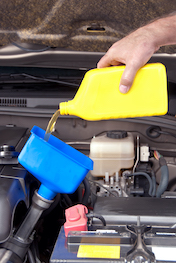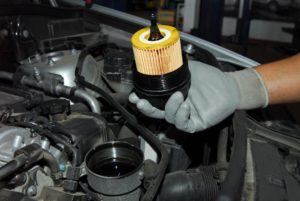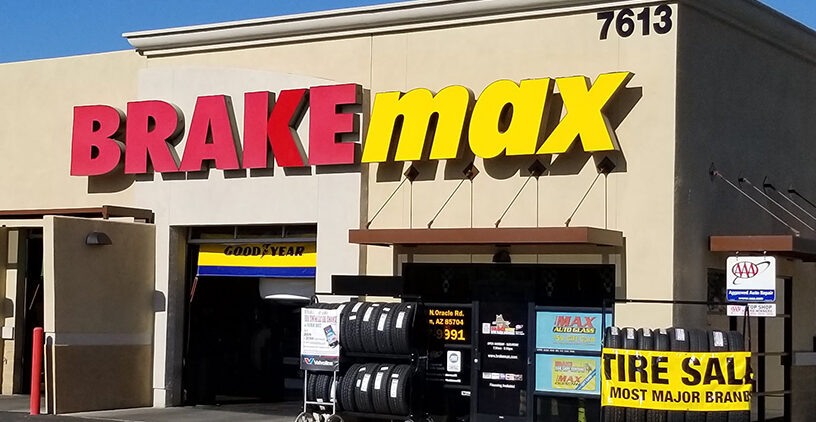Oil Change Service: Comprehensive Guide To Your Car’s Oil

Every time you turn the key to start your vehicle, you depend on your engine to crank up and continue to run smoothly. Making sure your engine has clean motor oil running through it is one way to help ensure it can consistently do this. This is why having an oil change done regularly is so important.
Engine oil plays a vital role in keeping components protected and things running optimally. Including oil change services in your vehicle’s preventative maintenance routine is one of the most effective and least expensive ways to extend the life of your engine.
In this guide, we break down everything you need to know about your engine’s oil, including how it protects your engine, the different types of oil, and when to get your oil changed.
The Different Ways Motor Oil Works To Protect Your Engine
Your engine’s oil works to keep your vehicle running smoothly, efficiently, and safely. To do this, it protects your engine in four important ways:
Keeps the engine clean
The oil absorbs dirt, debris, and deposits as it cycles through your engine, rendering it harmless until the dirty oil is removed during your next oil change service. This prevents build-ups and harmful blockages within your engine.
Reduces friction and prevents excess wear
Your engine contains dozens of sensitive components. The oil forms a protective layer of lubrication over all of these components. This prevents harsh metal-on-metal contact and reduces friction between any moving parts.
Prevents build of rust and corrosion
The lubricating layer of protection that is formed by the oil also protects the engine components from a build-up of rust and corrosion.
Eliminates heat build-up
As your vehicle runs, the engine generates a lot of heat. The motor oil works to absorb the excess heat away from sensitive areas and redistributes it throughout the rest of the engine, helping to prevent overheating.
But, engine oil can’t last forever. As the oil circulates through the engine, picking up dirt and debris and absorbing heat, it becomes less and less effective over time. So, not having the oil changed regularly can lead to clogs, sticking pistons, overheating, and even a completely seized-up engine.
By following the suggested oil change routine for your vehicle, you will ensure your engine always has the protection it needs to run its best and avoid expensive engine repairs.
How You Can Tell That Your Vehicle Needs An Oil Change
There are several warning signs to look out for that can indicate it may be time for an oil change service very soon such as:
- Having a low oil level when checking
 your oil dipstick
your oil dipstick - Seeing the “Check Engine”, “Oil Change Required”, or “Low Oil” light illuminated on your dashboard
- Checking the oil and it is overly thick, dark, and/or milky and comes out in globs
- Hearing unusual pinging, knocking, or ticking coming from the engine when it is running
- Seeing blue exhaust smoke coming from your tailpipe while the vehicle is running
- Smelling a strong burning oil odor inside the vehicle
If you notice any of these things above happening with your vehicle, bring it to your local BRAKEmax Tire & Service Centers locations as soon as possible.
The 4 Different Types Of Motor Oil
Today, engine oil comes in a variety of different options. Each with a varying level of viscosity (thickness), different additives, different levels of engine protection, and varying costs. The four main types of motor oil are:
Conventional Oil
A natural crude mineral oil, conventional motor oil, is partially refined to improve the protective properties and viscosity.
This oil, sometimes referred to as “standard oil”, is the most budget-friendly option, while it is still effective at protecting your engine. But compared to the other types of oil, it is not as refined. As a result, you won’t get the same levels of engine protection that you’ll see from synthetic oil, for example. It also becomes dirtier faster and will not last as long.
Full-Synthetic Oil
Alternatively, synthetic oil is manufactured entirely in a lab or factory. It is highly refined to contain only the best additives and elements of oil. The manufacturing process of this oil is highly controlled and must adhere to stringent standards. As a result it can provide the highest level of engine protection.
Cost-wise, a full-synthetic oil change will be more expensive compared to a conventional oil change. Usually, you’ll pay between $20 and $40 more for synthetic oil, depending on how many quarts of oil your vehicle requires. Given synthetic oil usually lasts longer, you may need to have an oil change done as frequently as you would with conventional oil.
Synthetic Blend Oil
Taking the best of both worlds, synthetic blend oil is a refined oil that is a hybrid of both full synthetic oil and conventional oil. Synthetic blend oil offers increased engine protection and better performance than conventional oil, but not as much as you’ll get with full-synthetic oil.
A synthetic blend will also typically last longer than conventional oil. The cost of a synthetic blend oil change will be slightly more expensive than conventional oil, but less than a synthetic oil change.
High-Mileage Oil
High-mileage oil was specially formulated to protect engines that have 75,000 miles or more. Refined similarly to synthetic oil, it provides added protection through unique additives, including viscosity modifiers, specialized cleansers, seal conditioners, and anti-corrosion agents.
Older engines are frequently plagued by oil burn-off and corrosion, both of which can lead to increased wear and tear on the engine. So, high-mileage oil provides the necessary added protection to improve the engine’s overall performance and extend its life.
How Often Should You Have An Oil Change Service Done?
The recommended service interval for oil changes is impacted by the specific type of vehicle you have, your driving habits, and the type of oil. To find the manufacturer-suggested schedule for your vehicle, we suggest you first check your owner’s manual. The recommendations can range between every 3,000 and 10,000 miles (with normal driving conditions).
As mentioned above, the type of engine oil also affects how often oil changes will be needed. For example, if full synthetic oil is currently being used in your engine, you will usually need to have an oil change service done every 5,000 to 7,500 miles, which would be less frequent than if you were to have used conventional oil.
Your oil, however, can lose its effectiveness faster due to certain driving habits. These include:
- High-mileage driving
- Frequent short trips or stop and go traffic
- Towing or hauling heavy loads frequently
- Higher outside temperatures (like we can experience here in Arizona)
At BRAKEmax Tire & Service Centers, our technicians recommend bringing your vehicle in for an oil change every 3,000 miles or 3 months, whichever comes first. This will help keep your engine performing at its best and ensures that any minor issues are caught early before they become bigger problems.
Make sure to check out our latest oil change coupons to make your next service even more affordable.
Regular Oil Change Services Keep Your Engine Running Its Best
Our ASE-certified technicians at BRAKEmax Tire & Service Centers can answer any questions you may have about your car’s oil, as well as help you determine the type of oil and schedule that’s best for your vehicle. We can also handle any other repairs or maintenance services you may need.
Looking for an oil change in Tucson? Look no further than BRAKEmax Tire & Service Centers. Local drivers trust our expert technicians for top-quality auto services, all backed by unbeatable customer service.










